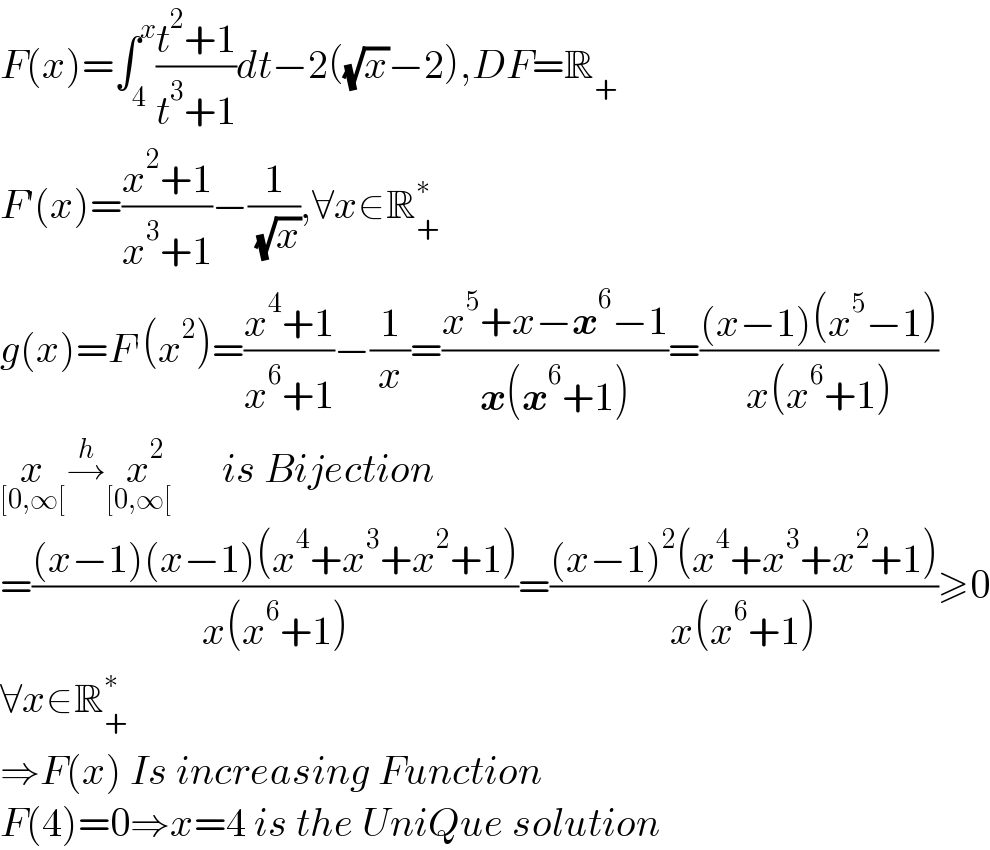
Question and Answers Forum
Question Number 176485 by Shrinava last updated on 20/Sep/22

Commented by mr W last updated on 20/Sep/22

Answered by a.lgnaoui last updated on 20/Sep/22
![∫((t^2 +1)/(t^3 +1))dt=∫(t^2 /(t^3 +1))+∫(1/(t^3 +1))dt =(1/2)∫((2t^2 )/(1+t^3 ))dt+∫(1/((t+1)(t^2 −t+1)))dt ∫(1/(t+1)(t^2 −t+1)))dt=(1/3)∫((1/(t+1))+((2−t)/(t^2 −t+1)))dt ∫((2−t)/(t^2 −t+1))dt=∫((−(t−(1/2))+(3/2))/((t−(1/2))^2 +(3/4)))dt =−(1/2)∫((2t−1)/(t^2 −t+1))+(3/2)×(4/3)∫(dt/([(2/( (√3)))(t−(1/2))]^2 +1)) =−(1/2)log(t^2 −t+1)+2Arctan [((√3)/3)(2t−1)] finalement I=(1/2)log(1+t^3 )+(1/3)log(1+t)−(1/2)log(t^2 −t+1)+(1/3)2Arctan [((√3)/3)(2t−1) ∫_4 ^x ((t^2 +1)/(t^3 +1))dt=(1/2)[((log(1+t^3 )]_4 ^x −log(1−t+t^2 ))]_4 ^x +(1/3)[log(1+t)]_4 ^x +(2/3)Arc[((√3)/3)(2t−1)]_4 ^x =(1/2)[log(((1+t^3 )/(1−t+t^2 )))]_4 ^x +(1/3)[log(1+t)]_4 ^x +(2/3)Arctan [((√3)/3)(2t−1)]_4^ ^x =(1/2)[log(1+t)]_4 ^x +(1/3)[log(1+t)]_4 ^x +(2/3)Arctan [((√3)/3)(2t−1)]_4 ^x (5/6)[log(1+x)−log5)]+(2/3)[Arctan (((√3)/3)2x−((√3)/3))−(2/3)Arctan ((7(√3))/3) (5/6)log(((1+x)/5))+(2/3)Arctan (((2(√3))/3) x−((√3)/3))−(2/3)Arctan (((7(√3))/3)) I=2((√x) −2) 1+x=1+((√x) )^2 (√x) =X log[((1+x)/5)]^(5/6) −2(√x) +Arctan ((√3)/3)(2x−1)=4+(2/4)Arctan( ((7(√3))/3)) log(((1+X^2 )/5))^(5/6) −2X+Arctan ((√3)/3)(2X^2 −1)−4−Arctan (((7(√3))/3))=0 ...](Q176488.png)
Commented by Shrinava last updated on 20/Sep/22

Commented by a.lgnaoui last updated on 20/Sep/22

Answered by Peace last updated on 20/Sep/22

